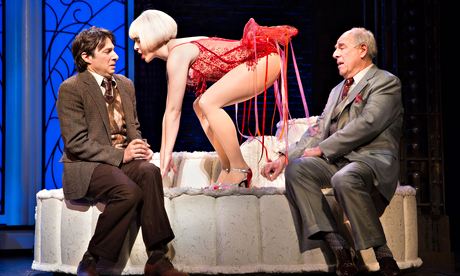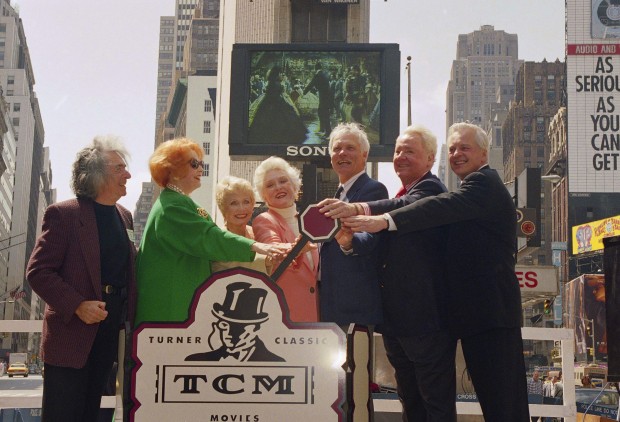In today’s Wall Street Journal drama column I review two New York openings, Bullets Over Broadway and The Heir Apparent. Here’s an excerpt.
* * *
How good can a jukebox musical be? As good as “Bullets Over Broadway,” Woody Allen’s new stage version of his 1994 film, directed and choreographed by Susan Stroman (“The Producers”). The book is funny, the staging inventive, the cast outstanding, the sets and costumes satisfyingly slick. All that’s missing is a purpose-written score, in place of which we get period-true arrangements of pop songs of the ’20s and ’30s. Does that matter? It did to me–a lot–but I doubt that many other people will boggle over the absence of original songs from “Bullets Over Broadway.” Except for a flabby finale, it has the sweet scent of a box-office smash….
 Ms. Stroman hasn’t rung the bell on Broadway since “Young Frankenstein,” but she remains peerless when it comes to comic choreography, and “Bullets” overflows with clever dances, including a feature for Heléne Yorke set to a 1927 double-entendre ditty called “I Want a Hot Dog for My Roll” that’s as naughty as you’d expect. Here and elsewhere, the gorgeously brassy Ms. Yorke steals the show from her better-known colleagues, but she has plenty of competition…
Ms. Stroman hasn’t rung the bell on Broadway since “Young Frankenstein,” but she remains peerless when it comes to comic choreography, and “Bullets” overflows with clever dances, including a feature for Heléne Yorke set to a 1927 double-entendre ditty called “I Want a Hot Dog for My Roll” that’s as naughty as you’d expect. Here and elsewhere, the gorgeously brassy Ms. Yorke steals the show from her better-known colleagues, but she has plenty of competition…
What about the score? Glen Kelly has written additional lyrics whose purpose is to integrate the musical sequences more smoothly into the plot, but the dramatic fit is never tight, and it doesn’t help that so many of the songs, in particular “Gee Baby, Ain’t I Good to You?” and “Up a Lazy River,” are so very familiar in their own right. Because of this, the momentum falters whenever the actors start to sing, though Ms. Stroman usually manages to get things moving again in reasonably short order….
“The Heir Apparent,” David Ives’ English-language version of Jean-François Regnard’s “Le Légataire universel,” is the latest of his brilliant “translaptations” (his word) of classic French verse comedies, in which Mr. Ives recasts the original text in briskly contemporary iambic pentameter and tinkers with the plot at will. It’s as elegantly wrought as its predecessors, “The Liar” (after Pierre Corneille’s “Le Menteur”) and “The School for Lies” (after Moliére’s “The Misanthrope”). Classic Stage Company, which brought “The School for Lies” to New York three years ago, has now done the same thing with “The Heir Apparent,” in which M. Regnard and his translaptator tell the cautionary tale of Geronte (Paxton Whitehead), a miser whose impecunious nephew (Dave Quay) endeavors by any means necessary to become his sole legatee, aided and abetted by Geronte’s scruple-free manservant (Carson Elrod). Mr. Ives’ couplets glitter with close-packed virtuosity: “That pillar of the church, that foe of whoredom,/That undisputed lord of bedroom boredom.” The cast is perfect, and John Rando’s staging is a slapsticky riot….
* * *
Read the whole thing here.
A scene from the original 2011 production of The Heir Apparent by the Shakespeare Theatre Company of Washington, D.C.:
Archives for April 11, 2014
TCM at 20
In today’s Wall Street Journal “Sightings” column I take note of an important cultural anniversary. Here’s an excerpt.
* * *
Twenty years ago next Monday, Turner Classic Movies went on the air, and the lives of film buffs were instantly improved almost beyond recognition. TCM is a basic cable channel owned by the Turner Broadcasting System that shows old movies, most of them released prior to 1970, around the clock. Some are familiar, others obscure, but all are uncut, uncolorized, uninterrupted by commercials and otherwise unaltered. No other enterprise has done more to make such films widely accessible to the general public….
 I doubt I’m the only viewer who routinely flicks through the coming month’s fare and earmarks a half-dozen films at a time for future recording. I am, in short, an ardent fan–but I wonder what the future holds in store for the channel that made Robert Osborne, TCM’s host-in-chief, a star. Will it continue to prosper? Or is TCM’s business model flawed in ways that could lead to its decline and fall?
I doubt I’m the only viewer who routinely flicks through the coming month’s fare and earmarks a half-dozen films at a time for future recording. I am, in short, an ardent fan–but I wonder what the future holds in store for the channel that made Robert Osborne, TCM’s host-in-chief, a star. Will it continue to prosper? Or is TCM’s business model flawed in ways that could lead to its decline and fall?
To answer these questions, it’s necessary to reflect on the way in which TCM transformed the culture of film in America. By 1994 the VCR had made it possible for most Americans to view movies in their living rooms, but few video stores carried a wide-ranging inventory of older films, nor were they shown other than sporadically on television. If you wanted to see or study the great films of the past, you usually had to buy your own copies. Then TCM came along and changed everything, quickly became indispensable to movie lovers everywhere.
That’s still true. Most of the old movies that I watch in any given week come from TCM. But the rise of on-demand TV is changing the viewing habits of film buffs. Why wait for TCM to show “Grand Hotel” next Thursday when Amazon Instant Video will stream it to your iPad right now for $1.99?…
* * *
Read the whole thing here.
Almanac: Ivy Compton-Burnett on plots
“As regards plots I find real life no help at all. Real life seems to have no plots.”
Ivy Compton-Burnett, “A Conversation Between I. Compton-Burnett and M. Jourdain”
